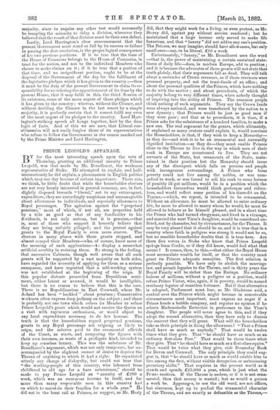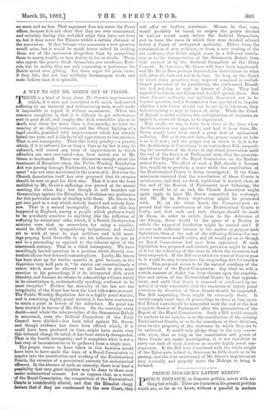PRINCE LEOPOLD'S APPANAGE.
BY far the most interesting speech upon the vote of Thursday, granting an additional annuity to Prince Leopold, was that made by Mr. Broadhurst, the workman representative of Stoke. Ho attempted to explain, and half- unconsciously he did explain, a phenomenon in English politics which may one day become of serious importance. There can, we think, be little doubt that while the householder electors are not very keenly interested in general economy, are, in fact, slightly disposed towards "liberal," not to say extravagant, expenditure, they are exceedingly suspicious and unmanageable about allowances to individuals, and especially allowances to Royal personages. The agitation against the "perpetual pensions," most of which, if not all, are properties held by a title as good as that of any fundholder to his dividends, is not only serious, but it is genuine,—that is, most of those who support it honestly believe that they are being unfairly pillaged ; and the protest against grants to the Royal Family is even more sincere. The electors in many places wish those grants stopped, and almost compel their Members—who, of course, know more of the meaning of such applications—t ) display a somewhat artificial acerbity in resisting them. SJ strong is the feeling, that successive Cabinets, though well aware that all such grants will be supported by a vast majority on both sides, have regarded the necessity of applying for them as a serious annoyance, and have regretted that a self-working system was not established at the beginning of the reign. If this popular distaste proceeded from Republican senti- ment, either latent or avowed, it would be intelligible, but there is no reason to believe that this is the case. There is no Republicanism in East Cornwall, where Mr. Acland has been " heckled " about pensions ; Conservative waikmen often express deep jealousy on the sullect ; and there is probably not one town which orders its Member to refuse Prince Leopold's grant which would not receive the Queen on a visit with rapturous enthusiasm, or would object to any local expenditure necessary to do her honour. The truth is that the householders regard perpetual pensions, grants to any Royal personage not reigning or likely to reign, and the salaries paid to the ornamental officials of the Court, as waste, and comparing the figures with their own incomes, as waste of a profligate kind, intended to keep up senseless luxury. This was the substance of Mr. Broadhurst's argument, which was not only temperate, but un- accompanied by the slightest nuance of desire to deprive the Throne of anything to which it had a right. He repudiated utterly any charge of disloyalty, but could not bear that "the working-people of this country, who laboured from childhood to old ago for a bare subsistence," should be made to pay Prince Leopold an "annuity of £280 a week, which was an enormous income in itself, and far more than many respectable men in this country had on which to maintain their families for a whole year He did not in the least rail at Princes, or suggest, as Mr. Healy
did, that they might work for a living, or even protest, as Mr. Storey did, against pay without service rendered ; but he maintained that a large income only served to make life luxurious, and that " luxury " did not add to any one's position. The Princes, we may imagine, should have allowances, but only small ones—say, to be liberal, £10 a week.
Unfortunately, luxury," as Mr. Broadhurst uses the word —that is, the power of maintaining a certain sustained state- liness of daily life—does, in modern Europe, add to position ; and it is because the advocates of these grants will not state that truth plainly, that their arguments fall so dead. They will talk about a surrender of Crown revenues, as if those revenues were personal property, and not the trust-funds of an office ; and about the personal qualities of the Princes, which have nothing to do with the matter ; and about precedents, of which the majority belong to very different times, when nobody thought of inquiring into the utility of Princes. The common people think nothing of such arguments. They say the Crown lands were always national, and were transferred by the nation to a new dynasty ; that Princes would be just as good men if they were poor ; and that as to precedents, it is time, if a Prince asks for the subsistence of a hundred families, to make a new one. The real argument for the grants, which ultimately, if explained as many orators could explain it, would convince the Householders, is that, if they wish to keep a Monarchy— as they do—and wish it to be an ornamental and outwardly dignified institution—as they do—they must enable Princes close to the Throne to live in the way in which men of their rank in Europe are accustomed to live. They are not servants of the State, but ornaments of the State, main- tained in their position lest the Monarchy should incur any of the disrespect which falls on persons and people with incongruous surroundings. A Prince who from poverty could not live among the nobles, or was com- pelled to work, or was forced to sell his rank to some heiress of possibly ill-got millions, would be in a position which the householders themselves would think grotesque and ridicu- lous, and would reflect some portion of his discredit on the Throne,—which, we repeat, is intended to be ornamental. Without an allowance, he Must be allowed to enter ordinary life, he must be allowed to marry whom he would, he mast be allowed to behave as he himself pleased, and in a short time the Prince who had turned clergyman, and lived in a vicarage, and Married the next Vicar's daughter, would be considered un- fitted, not by character, but by circumstances, for the Throne. It may be very absurd that it should be so, and it is true that in a country where faith in pedigree was strong it would not be so, but no sensible householder doubts that it is true here. Are there five voters in Stoke who know that Prince Leopold spivs from Cerdic, or if they did know, would feel what that meant ? It comes, then, to this,—that either the Royal House most accumulate wealth for itself, or that the country must grant its Princes adequate annuities. The first solution is perfectly possible. We have only to abolish the marriage Jaw, and permit legacies to the Throne, and in thirty years the Royal Family will be richer than the Barings. No ordinary heiress of millions, without a pedigree or a position, would refuse Prince Victor, who, again, if in poverty, would be named residuary legatee of countless fortunes. But if that alternative is adopted, Parliament must lose, as Mr. Gladstone said, a control over the Princes which might become in conceivable circumstances most important, must express no anger if a Prince heads a bubble company, and register no opinion if he selects Mademoiselle Entrechat in preference to the Vicar's daughter. The people will never agree to this, and if they adopt the second alternative, then they have only to discuss the amount that they will grant. What will the householders take as their principle in fixing the allowance ? "That a Prince shall have as much as anybody." That would be twelve times what they give. That "he should have as much as an ordinary first-class Peer." That would be three times what they give. That " he should have as much as a first-class squire." That would be twice what they give, vide Domesday Book for Devon and Cornwall. The only principle they could sug- gest is, that "he should have as much as would enable him to live among the first, without visible derogation or unbecoming pecuniary shifts." That requires in the present world as it stands and spends, £25,000 a year, which is just what the Prince receives. If the Throne is useless, or if it is not orna- mental, then that money is wasted ; but so would a guinea a week be. Appanages, to use the old word, are not offices, but sinecures, kept up to perfect the ornamental character of the Throne, and are exactly as defensible as the Throne,— no more and no less. That argument does not cover the Court offices, because it is not clear that they are ever ornamental, and certainly during this secluded reign they have not been so, but it does cover the Princes within a certain distance of the succession. If they became very numerous a new question would arise, but it would be much better solved by striking them out of the succession altogether, than by compelling them to marry wealth, or turn dealers in tea or stocks. Those who oppose the grants think themselves, par excellence, Radi- cals, but in reality they are only expressing a preference for Dutch metal over gilding. Let them argue for plain brass, if they like, but not buy rubbishy brummagem work, and make believe that it is splendid.



































 Previous page
Previous page